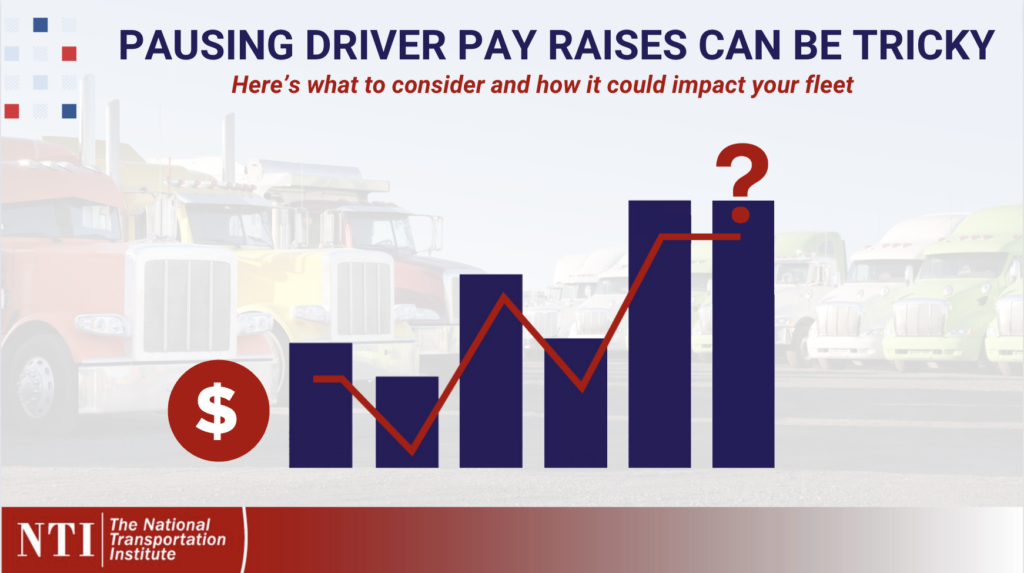The ongoing freight market correction cycle, which has suppressed rates despite rising operational costs for trucking companies, has left many carriers searching for ways to reign in expenses, including evaluating pausing pay increases for both new driver hires and existing personnel.
That’s also been a common line of questioning posed to NTI this year: Should we freeze driver pay? Should we reduce mileage pay for new drivers? If so, how do we inform drivers of this decision?
Pay momentum over the past year has slowed, but modest upward momentum for driver compensation has continued across all experience levels and trailer types for both mileage and hourly pay models — particularly for drivers at the higher end of the experience scale and those with specialized jobs.
If your fleet has evaluated pausing driver pay raises or implementing a pay freeze, here are a few considerations to make internally before making that critical decision — because it will have ramifications.
Unemployment is still low and job openings are still high.
There’s still a huge demand for people at businesses across the country, including those with whom trucking competes for available workforce. While both unemployment and the job openings rate have inched away from historical records, the dynamics of the macro labor market remain challenging for all industries, including trucking. So keep that element in mind before taking any action that could be perceived as punitive to your people and could push people out — particularly those you want to stick with you long-term.
The challenges in the macro labor market aren’t going away simply because of a temporary market flux.
➡️ Looking for alternatives to pausing driver pay raises? Consider these six driver pay strategies to excel in a down freight market ⬅️
Weigh the risk of long-term damage to your driver relationships versus managing costs because of a short-term cycle.
Safe, productive, dependable drivers are invaluable to every trucking company. Skipping expected pay increases could — and likely will — damage your fleet’s ability to retain drivers.
If you hired a driver two years ago and had a pay progression plan mapped out, that driver will expect you to stick to your word. If you don’t, it will feel like a betrayal and ultimately the relationship will likely be permanently damaged. Whether now or when hiring needs pick back up across the industry, drivers who feel that you didn’t honor your word will find opportunities elsewhere.
Will it really save that much money? Particularly long-term?
If you’re searching for answers to trim costs, will pausing driver pay increases for three months, six months, even nine months really be that effective?
Driver pay is one of the largest expenses for trucking companies, just as labor costs are one of any business’s biggest annual costs, if not the biggest. So it may seem logical to turn to pay freezes as a way to manage those costs. But if you look at the savings, is it really worth the risks outlined above? Particularly for tenure-based pay increases. Will awarding drivers who’ve reached certain tenure milestones really cost the company much in the short-term?
Because turnover is also extremely costly to fleets. Fleets spend thousands of dollars to get a lead and eventually convert that lead into a driver hire and a seated truck. Your fleet likely would see expenses increase to fight turnover costs related to driver pay pauses than to simply award drivers their expected pay raises.
By the time any savings from a pay freeze are seen, the market likely will be entering a new cycle anyways, in which pay raises might be needed to remain competitive in recruiting and retention.
If you must freeze pay raises, proper communication is a must.
Your fleet may be in a position where it has no choice but to trim payroll costs to survive the current market cycle. If that is the case, be honest, transparent, and authentic when communicating with drivers on the issue.
Ahead of implementing a pay freeze, communicate to your drivers about the changes in the market, the changes in customer demand and customer expectations, and what your expectations are for your drivers in the coming months. Also, communicate to them what the company and leadership are doing daily to keep them productive and earning while they safely deliver on your behalf.
If you can, let them know the situation is temporary and that previously planned pay increases will resume — and provide a date so that expectations are clear.


